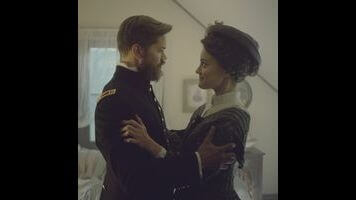John Cho playing William Shakespeare is exactly what I needed this week.
Watching John Cho prance around in tights and steal an entire theatre in order to construct The Globe didn’t exactly make me forget about the dark reality of Trump’s America. For me, television and art aren’t so much a way to distract or escape as a way to challenge norms, fight back, and subsist. Drunk History, in its own small way, pushes against the hatred emboldened by a Trump presidency. It’s a silly show about people getting drunk and slurring and burping their way through history lessons. But underneath the intoxication, there’s depth and subversion that you don’t get from more strictly educational programs. Drunk History gives attention and voice to some of history’s undervalued players—including women and people of color. But it also goes beyond that, casting actors of color as white historical figures before Hamilton did so on a larger stage.
We live in a world where real people were furious about Annie, a fictional character, being played by a little black girl. Every so often, Drunk History pointedly says “fuck that” to that sentiment in its approach to casting. John Cho playing William Shakespeare would have delighted me any day, any year. But at this precise time in history, John Cho playing William Shakespeare does more than delight. For people of color, it’s an emphatic declaration that we’re here, that we’ve always been here, no matter who tries to write us out or silence us. In a time when history is still persistently whitewashed, in a time when literal white supremacy has infiltrated the White House, watching a Korean-born immigrant play one of history’s most famous playwrights is powerful. In an interview with the Center For Asian American Media, Cho himself talked about how he’s locked out of certain genres because of his identity: “What I’m locked out of is American history,” he said. “There just aren’t roles written for Asians in stories that revolve around American history.” Again, Drunk History says “fuck that.” Just as all reenactors do on this show, Cho puts his own spin on the historical figure he’s playing, brings William Shakespeare to life with specificity and humanity. Drunk History doesn’t altogether rewrite history, but it does challenge the rigid structures history is most often told through.
In the Cho-led reenactment of the construction of The Globe, Maria Blasucci plays a man playing a woman in Shakespeare’s troupe, a subtle but smart play on how teen boys played women in Shakespeare’s time because theater was among the many arenas women were shut out of at the time. Whenever Drunk History dresses its ensemble players in drag, it isn’t played as a joke. Blasucci and Aasha Davis play men in almost every episode—to the point where I often don’t even think about it. But here, the choice seems deliberate and meaningful, a way to acknowledge the story’s context while also subverting it. Drunk History sticks to facts while still treating history as fluid and subjective. Twice in his narration, Mark Gagliardi mentions present times. Drunk History’s retelling of the past isn’t told in a vacuum.
Cho isn’t the only shining star of the episode. Taylor Schilling easily enters the ranks of top Drunk History reenactors with her embodiment of Daryl Johnson’s lispy cadence and her fun characterization of Emily Roebling. Just as last episode’s brilliant story about the Wright siblings focused on Katharine Wright, the retelling of the Brooklyn Bridge’s construction spotlights a woman who doesn’t receive enough credit for the role she played in history. John and Washington Roebling were crucial to planning the Brooklyn Bridge, but John’s wife Emily was crucial to executing their plans. She learned engineering in a time when women were shut out of engineering and mathematics. She accomplished what the world told her she couldn’t. Watching Schilling smack the heck out of those scoffing men with rolled up drafting paper feels weirdly cathartic.
Schilling’s hilarious in the role, too. Both her and Liev Schreiber as Victor Lustig in the second segment surprised me with just how good they are at cracking the Drunk History reenactor formula. It takes someone willing to commit to the goofiness of the show’s conceit, who can take on these characters with a theatrical physicality while still making them seem real and playing through the emotions of the stories.
During any other week, “Landmarks” would register as a solid episode of Drunk History. But this week, its conceit speaks louder. I won’t go so far as to say Drunk History provides an antidote to the dark reality of Trumpism, but Drunk History’s inclusive and subversive approach to teaching history matters at a time when it’s hard to remember why anything matters. It matters because of the people from history it highlights, like Emily Roebling, who defied gender roles and barriers in her own time. And it matters because of its open approach to casting that doesn’t confine actors to roles based on their race or gender. The show doesn’t adhere to the overwhelmingly white, overwhelming male dominant narrative of Western history. Drunk History, instead, fucks with history.
Stray observations
- The talking rooster is a nice touch in the first segment.
- “I’m Emily motherfucking Roman…Roebling.”
- Andrew Rannells is also great, even though he gets outshined by Schilling.
- The Cubdoop de Crill Lepdoo (The Four Seasons)
- “It’s not pussy, but yes, you’re right, it sounds like that.”
- Al Capone juggling dicks is a fantastic visual and also a sentence I never thought I’d write.
- I live in Brooklyn and walk across the Brooklyn Bridge from time to time, so it was nice seeing a piece of history that was close to home for me.

